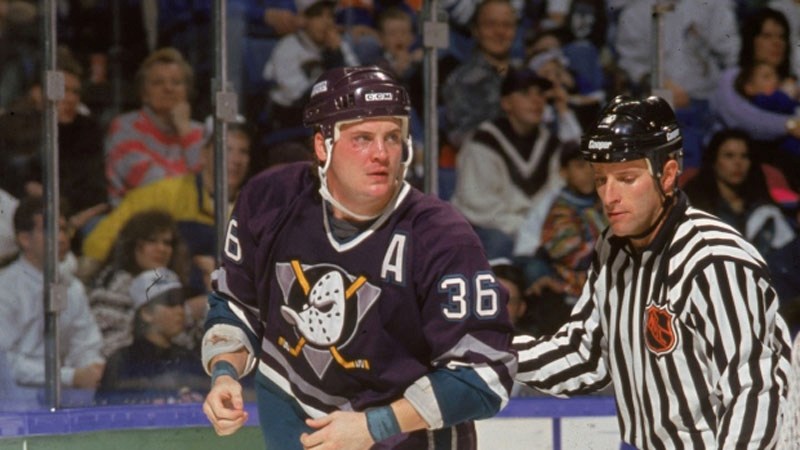An analysis of the brain of former National Hockey League enforcer Todd Ewen of St. Albert showed no signs of chronic traumatic encephalopathy (CTE), the Canadian Concussion Centre announced Tuesday.
CTE is a neurodegenerative brain disorder that has been linked to multiple concussions, which Ewen sustained during an 11-year NHL career while racking up 146 fighting majors and 1,911 penalty minutes in 518 regular-season games.
“These results indicate that in some athletes multiple concussions do not lead to the development of CTE,” Dr. Lili-NAz Hazrati, a neuropathologist with the Canadian Concussion Centre who conducted the autopsy, said in a press release. “Our findings continue to show that concussions can affect the brain in different ways. This underlines the need to not only continue this research but also be cautious about drawing any definitive conclusions about CTE until we have more data.”
Ewen suffered from memory loss, chronic body pain, diabetes and undiagnosed depression prior to his death of a self-inflicted gunshot wound at age 49 on Sept. 19 in St. Louis.
“We were very surprised by the results as we were sure Todd must have had CTE,” said Ewen’s widow, Kelli Ewen, in the release. “We hope that anyone suffering from the effects of concussion takes heart that their symptoms are not an automatic diagnosis of CTE. Depression coupled with other disorders can have many of the same symptoms as CTE.”
Ewen was the seventh former NHL enforcer to die in the past five years and three of the players’ brains belonging to Bob Probert, Derek Boogaard and Steve Montado, showed signs of CTE.
“Every time it was announced that a fellow player had CTE, Todd would say: ‘If they had CTE, I know I have CTE.’ He was terrified by the thought of a future living with a degenerative disease that could rob him of his quality of life and cause him to be a burden to his family,” said Kelli Ewen.
The Ewen family agreed to donate his brain to science when contacted by Hazrati. Doctors at a hospital in St. Louis agreed as part of their autopsy to remove the three-pound brain, packed it in a bag of persevering fluid and protective Styrofoam container and sent it by FedEx to Hazrati’s lab at the Hospital for Sick Children in Toronto.
Ewen’s brain was the 20th studied by the Canadian Concussion Centre and about half showed signs of CTE or the presence of another neurodegenerative disease.
The research team hopes to recruit 50 brain donations for the project and welcomes the commitment from current or former professional athletes. All donor information is kept private, except when the athlete or family consents to releasing their name.
Ewen was born in Saskatoon but grew up in St. Albert. At age 16, he left to play junior in British Columbia and in three seasons with the New Westminster Bruins in the Western Hockey League recorded 50 goals, 107 points and 769 penalty minutes.
He was drafted by the Edmonton Oilers in 1984 in the eighth round, 168th overall. The right winger, nicknamed The Animal for his aggressive style of play, went on to play for the St. Louis Blues, Montreal Canadians, Mighty Ducks of Anaheim and San Jose Sharks and posted career totals of 36 goals and 40 assists. His last NHL season was 1996/97 with San Jose.
Ewen won a Stanley Cup with Montreal in 1993.
A celebration of life for Ewen was held Oct. 9 at the Victory Life Church in St. Albert.




